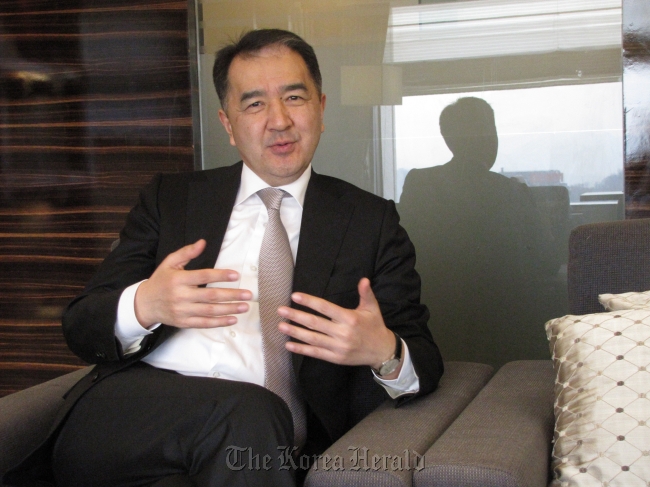Kazakhstan’s new first deputy prime minister, Bakytzhan Sagintayev, thinks of himself less as a politician, and more as a civil servant.
“I am first a civil servant, and then a politician,” said Sagintayev, who stepped into his role as first deputy prime minister and as minister of regional development on Jan. 16.
Although such modesty might be uncommon among political figures, it illustrates a characteristic that could be called an essential aspect of today’s Kazakhstan. Sagintayev, the country’s third-highest ranking leader, sat down with The Korea Herald for a face-to-face interview shortly after attending President Park Geun-hye’s inauguration ceremony on Monday.
In a speech on Dec. 12, Kazakh President Nursultan Nazarbayev outlined plans that set government policy for the next four decades with the aim of making Kazakhstan one of the world’s 30 most developed nations by 2050.
 |
Kazakh First Deputy Prime Minister Bakytzhan Sagintayev gestures during an interview with The Korea Herald shortly after he attended the inauguration ceremony of President Park Geun-hye in Seoul on Feb. 25. (Philip Iglauer/The Korea Herald) |
With “Kazakhstan 2050,” the nation has set a blueprint for development into the middle of the century. To get there, however, it will have to start leveraging its massive oil reserves like never before, earmarking investments decades in advance for long-term infrastructure projects and economic diversification into high-tech science and technology.
Kazakhstan’s plentiful oil wells will not last forever, the reasoning goes, and the country needs to plan for the future. The government is even creating a special tax regimen for businesses that focus on innovative technologies and the transfer of know-how for decades to come.
This is where Korea comes in. Relations have grown steadily since diplomatic ties were established in 1992 when Seoul opened its embassy in the former capital city of Almaty. Kazakhstan followed suit, opening its embassy here in 1996.
Last year marked a diplomatic milestone for the two nations: On top of celebrating 20 years of two-way ties, then-President Lee Myung-bak and Nazarbayev held high-level meetings twice, once during the nuclear security summit in March and again during Lee’s visit to Kazakhstan in September. Two huge energy deals valued at $4 billion each were inked in September.
Sagintayev himself was in Korea on two previous visits, in 2003 for an intergovernmental committee meeting and again last year for the Yeosu Expo. Last year’s trip was particularly meaningful because Kazakhstan’s largest city and current capital, Astana, will host the World Expo in 2017 with the theme of “future energy.”
Korea is guaranteed a 70 percent stake in a $4 billion project to build a coal-fired “green” power plant in the southern Kazakh city of Balkhash.
The Korea Electric Power Corporation and Samsung C&T currently each hold a 35 percent stake in the project to build the Balkhash power plant, a 1,320-megawatt coal-fired facility that, once online, is expected to generate about 7 percent of Kazakhstan’s electricity needs.
Korea’s LG Chemical and Kazakhstan Petrochemical Industries signed a contract to establish a joint venture to build a petrochemical complex in Atyrau on the northern banks of the Caspian Sea.
Sagintayev said Kazakhstan is looking to Korea for cooperation in knowledge sharing and technology transfers. “Resources-wise we are a very wealthy country now, but we need to do more to implement further restructuring, and we need advanced technologies to reach our goal,” he said.
Further developing Kazakhstan’s energy infrastructure puts the nation one step closer to meeting its ambitious mid-century economic goals.
The Central Asian nation’s forward-looking government planning already has some referring to the country as the “Singapore of the Steppes.”
And like Singapore, the government is self-consciously tolerant, aggressively promoting multiculturalism to attract international talent and keep its skilled multiethnic workers from leaving the country.
The country’s ethnic and religious openness might result from its troubled past, including Stalin-era persecution of Kazakh elites, artists and academics, and the mass relocation of Slavs and others including tens of thousands of ethnic Koreans. Today, some 100,000 ethnic Koreans live in Kazakhstan.
Although the country has the largest economy in Central Asia with a Human Development Index that is the envy of the developing world and a per capita annual income of about $13,000, it could have all been very different when Nazarbayev led the nation to independence in 1991.
Sagintayev attributes Kazakhstan’s success in development with an early decision to dismantle its nuclear arsenal left after the collapse of the USSR in 1991.
“At that time it was a bold decision, but since, it has proved to also be a very wise decision as well,” said Sagintayev. “Since then Kazakhstan has become a leader in the worldwide nuclear disarmament movement. Kazakhstan immediately condemned North Korea’s nuclear weapons test.”
Only two nations ever voluntarily gave up their nuclear stockpiles: Kazakhstan in 1991 and South Africa in 1994.
Now Kazakhstan is a leader in the worldwide movement for nuclear disarmament. Kazakhstan’s leadership in nuclear disarmament helped set up the so-called P5 +1 Talks between Iran and six nations, which took place in Almaty. The talks concluded on Wednesday with an agreement to meet again for high-level negotiations in April.
At the proposal of Kazakhstan, the United Nations General Assembly set Aug. 29 as the international day against nuclear tests.
By Philip Iglauer (
ephilip2011@heraldcorp.com)








